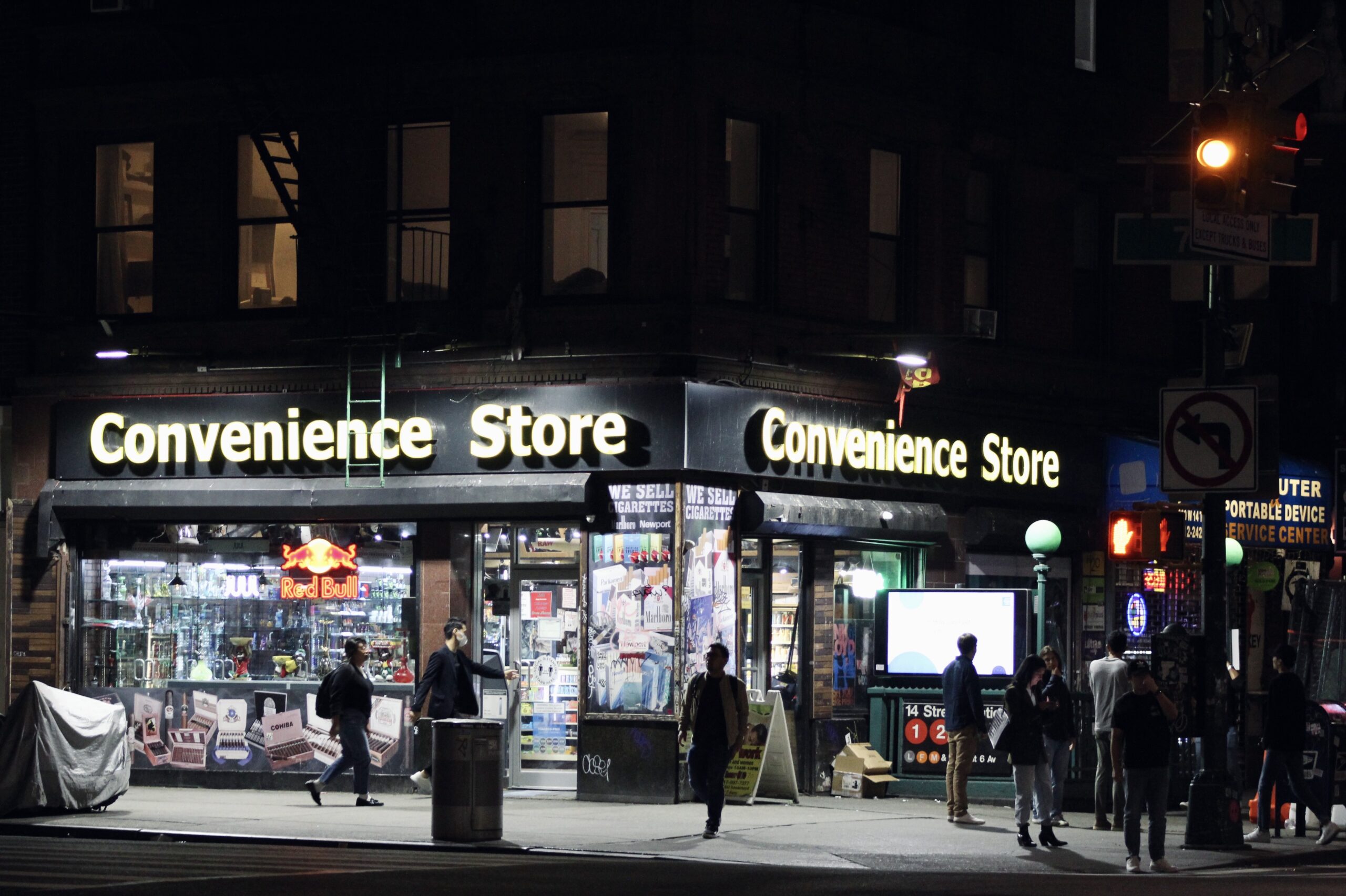By Yaldaz Sadakova
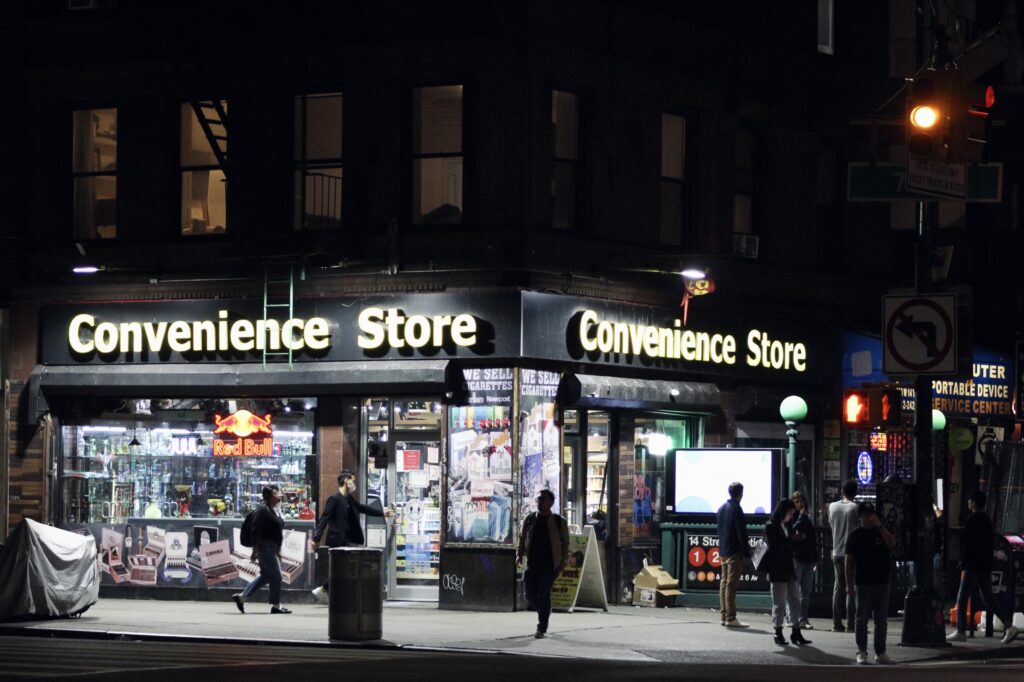
I emerge from the Penn Station subway just as the evening sky turns purple. Sixth Avenue looks the same, as if no time has passed. Welcome home, an internal voice says.
Its use of the word home surprises me. I’ve been through several lifetimes and incarnations since New York was my home. Since it dumped me. I’m here to see how it has fared without me. I need to get closure, an apology perhaps.
I unzip my light jacket. It’s quite warm for late September. At 32nd Street I realize I’m going south instead of north. I’ve clearly lost my ability to navigate this place. I turn around and, weighed down by my heavy backpack, head north towards Times Square, where I’ll jump on the Queens-bound 7 train.
Now when I look more carefully, I notice the changes on the street. Some storefronts are boarded up, with for lease signs in the windows. It’s disturbing to see these signs in this part of town. This must be the impact of the pandemic. It’s been more than two years since that fateful moment in March 2020 when the entire world shut down.
Help wanted ads are everywhere. That was not the case during the 2008 financial crisis. Back then, finding a job in this city was nothing short of a miracle.
My mind flashes to that time in December 2008 when I went for a job interview at a restaurant in the Village, near St. Marks Place. A huge crowd of people had already gathered in front of the restaurant, waiting to be interviewed. I encountered these crowds anytime I went to interviews at restaurants.
However, the help wanted signs of today don’t feel like a victory for labor, like an opportunity for minimum-wage folks to use the talent shortage to their advantage and exert their power. Even knowledge workers, who enjoy many privileges, have already lost gains they accrued during the pandemic, such as working remotely all the time.
This is why the help wanted signs remind me of precarity. In fact, the entire metropolis is suffused with this familiar sense of precarity. This sense that everyone here, especially people in service jobs, is one step away from financial disaster. That one step could be an unexpected medical bill or a layoff.
Holding a Grudge
The 7 train is packed. Most people are unmasked, as if COVID has gone away. I adjust my own mask to make sure it’s snug.
Soon, the train surfaces onto the elevated subway track in Queens, the borough which has always been doubly special to me. It was both my home and my journalism beat.
The sight of the glowing Long Island City skyline gives me a jolt. It looks mostly the same, the vestiges of its industrial past still evident—warehouses, factory buildings and auto repair shops punctuated by old apartments, graffiti everywhere.
But there are some new additions: a Trader Joe’s and condo towers I don’t remember seeing here before.
Memories of walking these streets come to me. Memories of reporting on clashes between developers looking to build hotels on residential streets not too far from here and home owners trying to ward them off. The developers ended up winning.
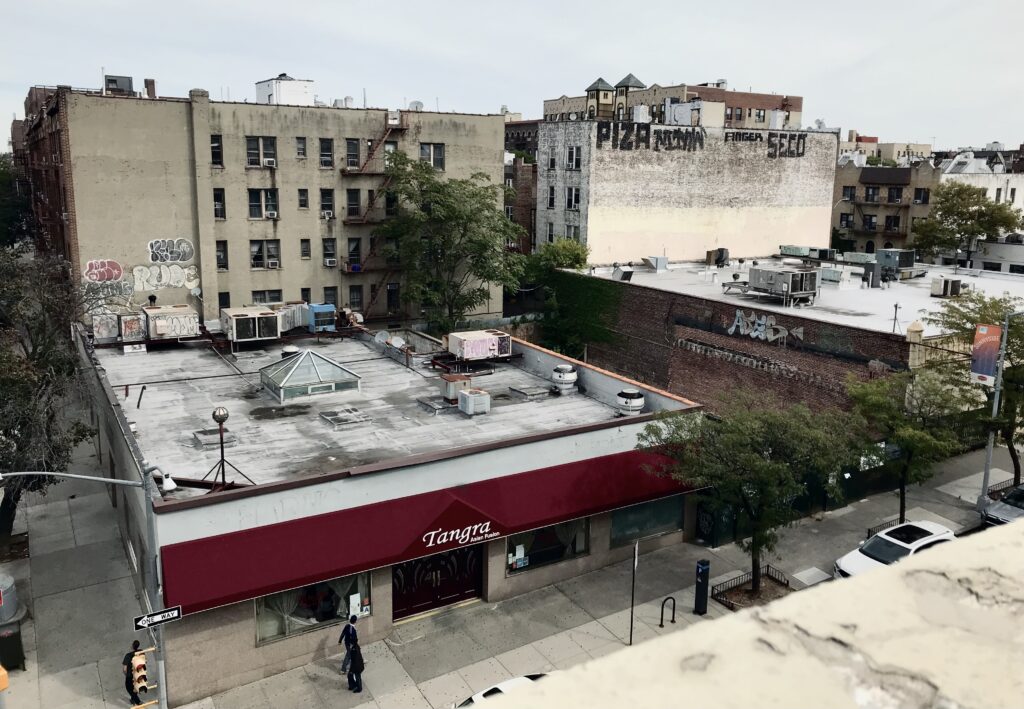
Queens Boulevard in Sunnyside, Queens. Photo by Yaldaz Sadakova.
I get off in Sunnyside. Queens Boulevard is much grubbier than before. The bodegas look depressing. So do the McDonalds and White Castle joints. Was Queens always this depressing and I just accepted it? Or has it deteriorated? It feels like the latter.
As I approach my hotel, I wonder about the universal urge to revisit the places you’ve lived in, to see how they’ve changed. Maybe it’s a way to reassure yourself about the realness and permanence of your existence. Look, this thing which was here when I was here is still here.
Of course, permanence is an illusion. Death is a part of every moment. Failing to accept that and holding onto things that have run their course is a recipe for suffering. That’s Buddhism 101.
Yet, here I am, still holding a grudge against New York—the love of my life, the center of my universe, the center of the universe. I still haven’t gotten over the fact that it rejected me 13 years ago because I was nothing more than a fling for it.
I’d get back together if New York was only to suggest it. I’d restart our situationship without hesitation. Non-reciprocal relationships are my specialty. Adapting to dysfunction is my forte. Clinging when I’m neglected and staying silent when I’m mistreated is second nature to me.
I’m the perfect fit for a narcissist like New York. How come it never saw that?
Holy Trinity
Day two. I arrive at Union Square, home to my holy trinity—Barnes & Noble, the Strand and the park itself. I’m also here because of Whole Foods, to get vegan lunch. I’ve turned into one of those annoying health-conscious vegans.
If the New York version of me could see that, she’d laugh her ass off. She made fun of people like me. Of course, she hadn’t yet experienced uterine biopsies and surgeries. She hadn’t been confined yet to a hospital bed with her arms and legs literally paralyzed, fighting for her life.
On a metal table in the park, next to a rose bush, I lay out my Whole Foods purchases: a piece of vegan spanakopita, plus a salad of kale with cauliflower and beans.
Vendors selling jewelry, scarves and paintings have set up their stalls on the south side of the park. Next to them, Hare Krishnas in saris and kurtas are singing the Hare Krishna chant.
I bite into the spanakopita. Divine crispy perfection. I’ve been craving it. This one is better than the banitsa phyllo pie I grew up with in Bulgaria because the Bulgarian version doesn’t have spinach.
I don’t take it for granted that I can afford to eat well. Back in 2008, even junk food was beyond my means, but during the pandemic I was one of the lucky ones. I landed an editorial job which turned out to be the best job I’ve had, a job I refer to as my good karma job.
The repetitive Hare Krishna chant gets on my nerves after a while. My left leg starts to hurt, non-stop electric shocks which radiate from my hip all the way down to my ankle. This happens whenever I sit for more than five minutes.
I’ve had this pain for a few weeks and I’ve learned that it doesn’t respond to anything. Not to pills, not to ointments, not to lidocaine, not to ice or hot packs. Walking is the only thing that provides relief. Who knew that a pinched sciatic nerve can bring this kind of hell?
I quickly finish my salad and cross to 17th Street and Union Square West in search of the Havana Central restaurant. I know that the Union Square location of the Havana chain closed down a few years ago. However, I want to see if I can find the exact spot where the restaurant used to be. I walk up and down 17th Street a couple of times, feeling disoriented. All the establishments are unfamiliar.
Then I find the site. It’s now a Potbelly shop. What a win for the neighborhood, replacing delicious homestyle Cuban food with obesogenic sandwiches. I walk up to the window and examine the interior. The design of the bar counter has changed and the tables are positioned differently, but it’s the same space.
“Is This Where You Work Now?”
I started working at Havana in February 2009 as a hostess.
I’d just been denied a full-time communications job in Bay Ridge for no reason other than my Bulgarian nationality. The hiring manager withdrew the offer he’d extended when he found out that my work permit would expire in a few months and I’d need to be sponsored for a work visa, the infamous H1B.
Two months before that, right before the Christmas holidays, I’d been laid off from my reporting position at The Queens Courier without any notice and severance.
I was beyond grateful for the Havana job. I’d applied to many restaurants after losing the communications job offer and I’d been rejected by all.
The only work I’d managed to secure was spreading flyers in Williamsburg for a week. That gig paid $30 for the entire week. By the time I started at Havana, my bank account had dipped to less than $100.
Technically, I wasn’t supposed to be employed at the restaurant. My permit allowed me to work only in journalism or a related field because my degree was in journalism.
But the Havana HR person never questioned me. Whether she didn’t know all the intricacies around hiring foreigners or whether the company chose to look the other way, I’ll never know.
One summer evening while I was greeting guests for dinner at the front desk, a classmate from my journalism program at Columbia walked in with a group of people. My smile froze.
“Oh hey!” she exclaimed, her eyebrows raised. “Is this where you work now?” The surprise and pity on her face were unmistakable.
“Yes, it is!” I responded in a chirpy voice, although I wanted nothing more than to crawl in a hole.
I could see myself from the outside. I could see how pathetic I looked standing there with a pink plastic daisy clipped to the side of my hair, a ridiculous daisy which was part of my uniform.
Then again, pretty much everyone at Havana was like me. My coworkers had big career dreams outside the restaurant. The servers and bartenders were models, stand-up comedians, musicians, actors, university students.
One server often practiced lines under her breath for upcoming theater performances while folding napkins at the start of her shifts. I learned from her that the hospitality industry is the top employer of New York’s creatives.
When I wasn’t at Havana, I constantly applied for journalism jobs and other editorial positions. Despite the recession and despite the withdrawn communications job offer, I fervently believed that I could get a job and that the job would sponsor me for a visa.
I thought it was a matter of hard work. I knew I was at the mercy of systemic immigration barriers over which I had no control, but I’d drunk the Kool-Aid about hard work and personal agency.
A month before my permit expired, I still hadn’t secured an editorial job, let alone a visa sponsorship. I had only landed an interview for a reporter position at a newspaper in Queens, but I didn’t make it to the second round. I kept applying.
A week before my visa expired, I was invited to an interview for a reporter position at another small paper in Queens. I didn’t go because what was the point?
A few days later, at the end of September 2009, I quit Havana and left New York for good. I had failed.
Proper Bookstore
After paying my respects to the vanished Havana site, I amble over to the Strand. I take my time at the carts outside.
Once inside, I hungrily inhale the smell of books and browse through new nonfiction releases. It’s so satisfying to be in a proper bookstore, one that is chockfull of interesting books. That’s something I miss about New York.
There’s basically just one bookstore chain in Toronto—Indigo, which is a watered-down version of Barnes & Noble. Even that is too generous of a description for it.
Indigo has a corporate generic esthetic and spartan chairs which discourage even the mere thought to sit down and read.
Almost half of its merchandise is comprised of overpriced items that are not books: candles, pots, plates, mugs, oven mitts, towels, bed sheets, blankets, pillows, pajamas, socks, purses, scarves, jewelry, tea, body lotion and yoga mats.
It’s a cross between Anthropologie and Bed Bath & Beyond. After all, the best way to lure book lovers is with bedding, skin care and accessories. The limited selection of book titles that Indigo does carry is too homogenous for my taste.
The stock at Toronto’s indie bookshops isn’t diverse enough either. What kills me is that if you tour all the city’s bookstores, and there aren’t many of them, you’ll see the same titles over and over. The stores are practically indistinguishable from one another. I can only think of one exception.
There’s nothing in Toronto that bears even remote resemblance to the Strand or to the Shakespeare in Paris. Nothing that casts a spell on you with its quirks and edginess. That’s a high bar, but so what?
Maybe I’ve outgrown Toronto. Even thinking that makes me feel guilty because Toronto and Canada have been good to me. After New York dumped me, Canada took me in. It committed to me quickly. It gave me citizenship, a privilege I know the value of.
After checking out all the display tables on the first floor of the Strand, I go to the basement to search for more nonfiction. Before I know it, I lose myself in the eastern religions aisle, leafing through books on Tibetan Buddhism, Vedanta and Sanatana Dharma.
I used to visit the Strand every night after my Havana shift. I would peruse the books in the carts outside, although I had no money to buy anything.
Then I’d saunter through the Village, absorbing the bohemian vibe. I’d pass cute cafés and restaurants, painfully aware that I couldn’t afford to eat in those places. I’d marvel at the soft-lit windows of the brownstone apartments filled with books and antique furniture.
At Canal Street, I’d catch the Queens-bound A train to go home to Ozone Park, to the tiny room I rented in a tiny house sandwiched between other tiny dilapidated houses.
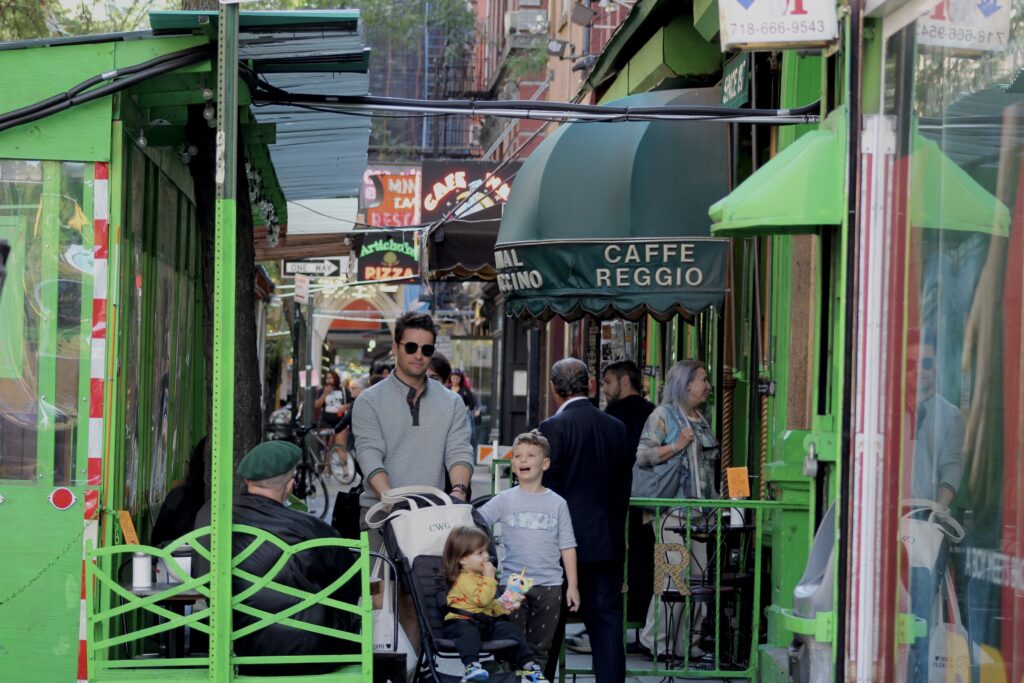
Caffe Reggio in the West Village. Photo by Yaldaz Sadakova.
Now I leave the Strand with three books—The Essence of Vedanta, The Tyranny of Merit, The Literary Mafia—and stroll through the Village. I must be retracing my steps from my Havana days.
A remnant of the boho spirit is still here. The shabby chic restaurants with battered sidewalk tables are as bustling as ever. But among them, high-end fast-food joints selling supposedly healthy dishes have sprung up. This is not the Village of Patti Smith and Leonard Cohen.
I can’t say I’m too sad about this latest wave of gentrification. It was inevitable. And it’s not like in the previous, less gentrified, version of the Village I was part of the ingroup.
I sit down in Washington Square Park, near the arch. On the bench next to me, an elderly couple is conversing in German. Tourists, most likely.
I watch passersby, without registering details. I’m just soaking in the energy, relishing the slow pace of it all and the opportunity to escape my routine. No work, no yoga, no meditation, no cooking, no writing, no planning.
I haven’t told anyone I’m here. I don’t feel like meeting up with anyone. I’m crabby because of my leg and I can’t sit for more than a few minutes. I’m not in the mood to accommodate the busy schedules of friends with kids.
Plus, I want the city all to myself. I want to take my time, walk aimlessly, hang out in bookstores, do things on a whim.
Last time I came here, in 2015, I was with R. We spent our whole trip running from one place to another, racing against the clock. It was my first visit to New York since it had broken up with me. I couldn’t get a moment alone with it. I couldn’t get closure.
A rat scurries towards my feet. I shriek and jump from the bench, my skin crawling. Which is good, because my leg hurts again.
Double Standard
Day four. The overhead N train rattles past low-rise buildings and Eastern Orthodox churches in the blazing sun. Astoria’s skyline hasn’t changed. Even the automated female voice which announces the stops is the same. I’ve stepped into the past.
I get off at 30th Avenue and 31st Street and head towards Steinway Street. Vegan spanakopita signs adorn the windows of numerous Greek cafés.
For all its gentrification, Astoria still seems to be devoid of tourists. It still has a community atmosphere, tricking you into believing that this is a place where you can belong.
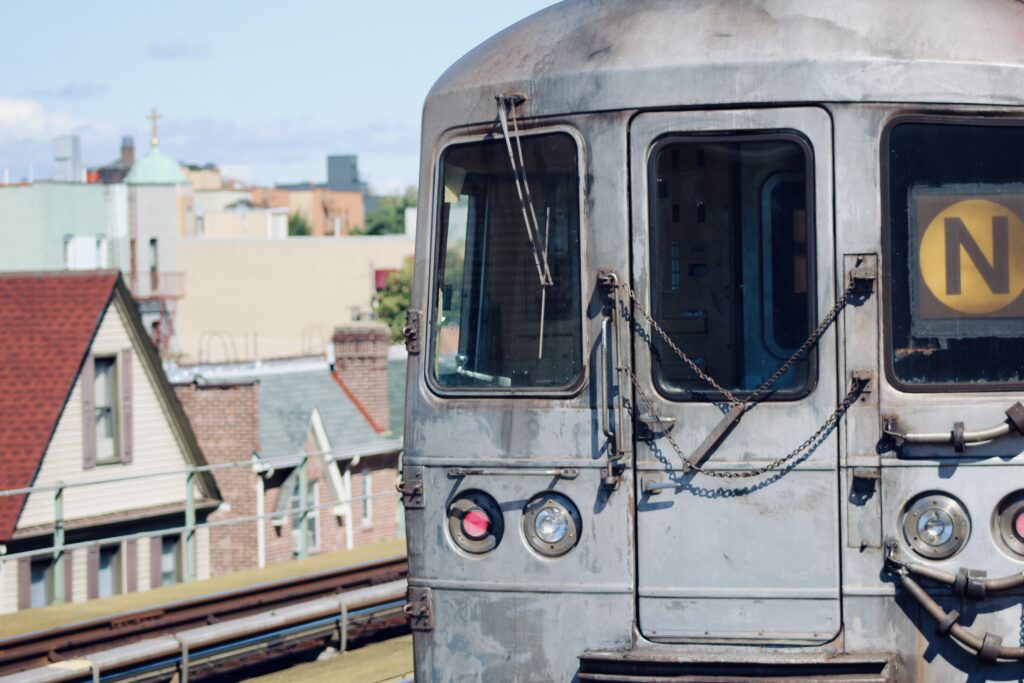
N train in Astoria, Queens. Photo by Yaldaz Sadakova.
When I turn onto Steinway, the first thing I do is to check whether the Layali Beirut is there. It is. Unbelievable. Sweeping the curb in front of the shisha lounge is a man with a red fez and a red vest. He looks like he’s been transported here into Little Egypt straight from the Ottoman empire.
These staff uniforms didn’t exist back when I visited the place with M. We came a few times during our second semester at the J-School. Over Turkish coffee for me, one of the cheapest items on the menu, and hookah for him, we would talk about our school assignments, journalism and Palestine, enveloped by fruit-scented clouds of smoke.
One night M explained to me how he as a Palestinian is subjected to different standards than white journalists. He said that in the U.S., minority journalists are constantly accused of not being objective when they cover the demographic groups they’re a part of in a way white reporters never are.
At that time, I didn’t understand what he meant. Now I do.
But I shouldn’t idealize those conversations with M. We were never that close. There was a barrier between us, the same barrier which existed between me and everyone else at the J-School. The barrier of my poverty. Other barriers, too.
I continue walking on Steinway towards Astoria Boulevard, passing many of the same Arabic grocery stores from more than a decade ago. From the windows of the bakeries, the baklava and kanafa topped with crushed pistachios beckon me.
Maybe I should go in for some baklava and taste my childhood, my home. Wait, what am I thinking? The baklava is vegan, yes, but it’s also doused in sugar.
At 24th Street, the Al-Iman Mosque looks unassuming with its boxy marble exterior, just as before. I remember the time when I came here to cover the start of Ramadan for The Courier. It was my first time ever entering a mosque at the age of 26. Before the prayer began, women broke their fast with dates, which they offered to me—delicious, succulent, fibrous dates.
The atheist in me is fascinated that I gravitated towards writing about Muslim communities in Queens. While growing up in Bulgaria, I’d done my best to distance myself from my Turkish Muslim heritage. I had to suppress my otherness at all costs.
But in New York, I was free from my past and nobody cared about my background. It was acceptable to be more than one thing, to have a complicated relationship with it all, to be a contradiction.
On the Margins
Day seven. I get off the Number 1 train at 116th Street and Broadway. I’ve been postponing my visit to the Columbia campus, the site of my epic failure. No wonder I left it for the last day.
With a cup of green tea in hand, I park myself on a bench in front of the J-School, facing the Thomas Jefferson statue. The building’s majestic stone façade exudes quiet old-money confidence, as always.
It’s so surreal, and a bit creepy, to sit here like that after all these years, my face hidden behind sunglasses. But of course, I was an outsider even when I had the access card to enter this building. Tears sting my eyes and I blink them back.
I thought I’d already processed the trauma from my time at the J-School when a few years ago I wrote Foreign, Poor and in the Ivy League.
In that essay, I talked about how I felt unworthy of my full scholarship, how I didn’t make any real friends, how I could barely afford even junk food. How I had to skip my graduation because I didn’t have the money to rent a gown, so there’s no photo of me wearing the iconic sky blue Columbia gown.
I was shocked when I received messages from multiple people who told me they could see themselves in my story. They thanked me for putting into words experiences they’d struggled to articulate.
The New Yorker’s Jelani Cobb, his tall big frame decked out in a gray suit, enters the building, holding open the wooden door for a student behind him.
I no longer keep track of the J-School news. When Columbia alumni emails land in my inbox, I delete them without opening them. But I do know, mostly from Twitter, that Jelani is the current dean. The school’s first Black dean, an agent of change who wants to make this institution, and journalism itself, more accessible to low-income diverse folks.
The odds are against him, but I hope he’ll succeed.
Students with backpacks go in and out of the building, presumably rushing to reporting assignments in different parts of the city and rushing back to write their stories or edit their video or audio. Just like we did all these years ago.
Other students are seated at the metal tables in front of the building, typing on their MacBooks while eating lunches out of paper boxes and enjoying the summer-like autumn day.
How many of these students will remain in journalism? Some will. They’ll go on to tell important stories, win awards, secure book deals.
How many will join online media start-ups which are the news outlets du jour—start-ups which promise to revolutionize journalism’s business models—only to be laid off a few years later after these shiny outlets fold?
How many will pivot to communications and other editorial fields?
If my current self had told 25-year-old me upon her Columbia graduation that her Ivy League degree would do nothing to further her career in media, that she’d leave both journalism and New York, she wouldn’t have believed it. She wanted nothing more than to be a journalist and to stay in New York.
She failed on both counts, even though she gave journalism her everything. All her hours, all her heart, all her health.
Or rather, journalism, including this very school, failed her. Immigration policies failed her.
It took me the longest time ever to figure that out. To realize that abiding by all the ethics and reporting rules J-School taught me doesn’t guarantee success in the real world.
It took me years to understand that the media world isn’t designed for someone like me—a poor person with no connections in the industry who also happens to be a foreigner with a non-English name and a foreign accent…who also happens to need sponsorship for a work visa. Talk about intersectionality.
It took me forever to recognize that my inability to make it in journalism is not an indictment on my skills and commitment. It’s an indictment on the industry’s structural barriers.
These barriers are the reason why media jobs on the margins were all I could get, although, like every budding journalist, I wanted to work for one of the big names.
After being laid off by The Courier, I freelanced in Brussels for a couple of years. My main client was a controversial TV channel funded by the Iranian government, which made me a pariah in the Brussels press corps and, together with my status as a foreigner, ensured that I couldn’t get a full-time reporting job at another outlet in the city. Then I spent three years working at an obscure financial trade magazine in Toronto.
The cruel voice in my head insists that none of these roles was Real Journalism. I counter that it was because I always followed the rules I was taught—verifying information, not fabricating quotes, doing actual reporting.
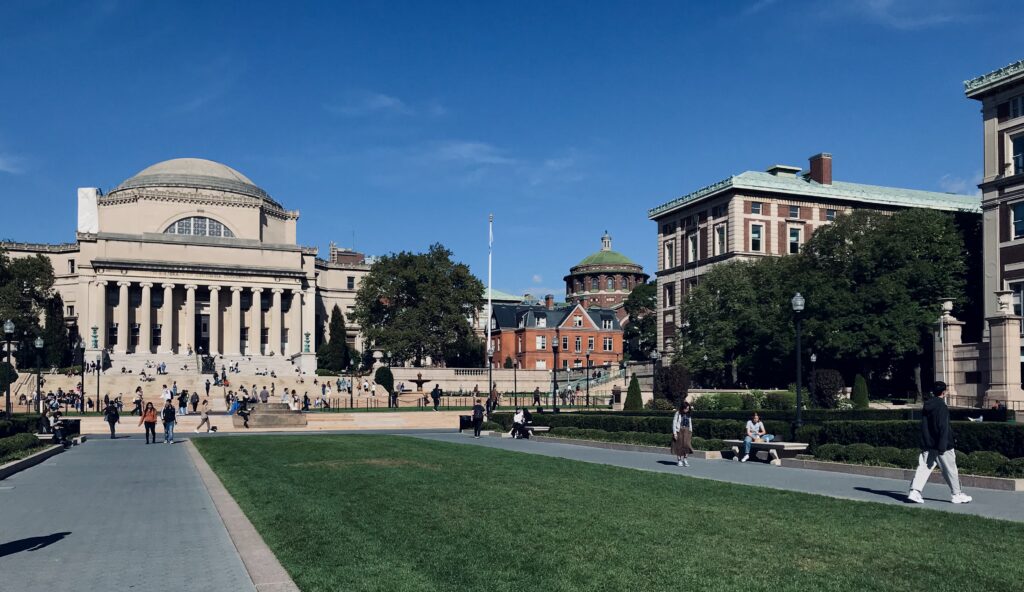
Columbia University campus. Photo by Yaldaz Sadakova.
Subjective
Although journalism failed me, I still can’t stop thinking like a journalist, even six years after leaving the profession. As soon as I start writing, my journalistic instincts kick in.
They compel me to spell everything out right away, to explain things as clearly as possible, to eliminate any ambiguity or mystery, to hedge every statement with wishy-washy modifiers, to not trust myself or the reader. With creative writing, this is the kiss of death.
A while back I read Sommerset Maugham’s memoir The Summing Up, where he says that being a journalist beats the uniqueness out of you. He calls it the most dangerous occupation for a writer.
“There is an impersonality in a newspaper that insensibly affects the writer. People who write much for the press seem to lose the faculty of seeing things for themselves; they see them from a generalized standpoint, vividly often, sometimes with hectic brightness, yet never with that idiosyncrasy which may give only a partial picture of the facts, but is suffused by the personality of the observer. The press, in fact, kills the individuality of those who write for it.”
This passage is highlighted in pink in my copy of the book. I’ve read it over and over. It gives me chills every time. It’s harsh, but there’s some truth in it.
However, there are days, like today, when I miss journalism.
I miss the opportunity to see places and people I would have never encountered otherwise. Thanks to journalism, I discovered parts of the real New York, the New York beyond Manhattan’s touristy attractions.
I miss reporting. I miss the high you get from learning something interesting you may have never learned otherwise. And then piecing it all together on deadline, creating something out of nothing. The satisfaction of that is amazing.
I miss following a writing style that discourages the use of the Oxford comma, which is the most pretentious and useless piece of punctuation. Only rarely is an Oxford comma justified.
What I don’t miss is being bullied by editors. Editors yelling at me in a room full of people. Editors rewriting my words without checking whether I’m comfortable with their changes. Editors introducing mistakes in my articles.
I don’t miss the exploitative nature of the business, the ludicrous pay. I don’t miss working during all my waking hours, yet being poor.
I don’t miss the lack of diversity, especially in the higher echelons. I don’t miss seeing the lack of diversity translate into coverage which is misleading and devoid of nuance—or into the conspicuous absence of important stories from news lineups.
I don’t miss the pretense of objectivity. The pretense that all sides to an issue are equally valid and should carry equal weight. The pretense that as a journalist, you can come at a subject smack in the middle and be aware of all your biases, which you can then set aside as easily as you’d cast off a garment.
Everybody brings biases to their stories based on their lived experience, but many editors and reporters aren’t aware of how their background colors their worldview.
I don’t miss the double standard M talked about at the Layali Beirut. The double standard where the news judgement of certain journalists is never questioned and they keep their jobs despite having obvious conflicts of interest.
For example, your beat is X, while your spouse also works in the field of X and his colleagues often serve as your sources, but your employer—the newspaper of record, no less—backs you up in the face of public criticism about your personal ties to your beat.
Or you manufacture quotes, plagiarize content, express political opinions on social media or do advocacy work on the side, but you somehow don’t get fired and your reputation remains unscathed.
Someone like me would have never been able to pull off any of this. Had I broken the rules in such a brazen way, I would have been out the door right away, forever ostracized and unemployable in journalism. Well, I ended up ostracized anyway.
I don’t miss the dogmatic view that the editor is always right and if you question them, you’re a diva. I don’t miss the fallacy that the editor is an omniscient entity that has the god-like ability to assess every story pitch with immaculate fairness, decide with perfect neutrality which issues deserve the most attention and edit every article with complete objectivity.
Journalism is a subjective business, shaped by the interests of those who fund and run it, but it has yet to publicly acknowledge that. It has yet to publicly acknowledge that nothing about the way it operates is neutral or objective because every editorial decision is influenced by a personal, political or financial motivation.
Rest in Peace
My leg starts to hurt. I must have been sitting here for more than 15 minutes. Over the past couple of days, the pain has gotten worse. Is this sciatica going to become my permanent companion? Will I have to live with the electric shocks?
I stand up and stretch my hamstring on the bench. It brings me some relief. I realize that I came here, to the J-School, because I’m grieving. I’m mourning the loss of my journalism dream. It’s like visiting the grave of a loved one.
My journalism dream didn’t die on the Columbia campus, though. It died a slow death in many places—in Queens, in Brussels, in Toronto. Rest in peace, my journalism dream.
I toss my empty tea cup in a trash can and sneak into the J-School behind a student. The grand lobby looks the same, so I once again have this eerie feeling of going back in time.
I’m overwhelmed by the urge to check out the radio lab on the fifth floor and the TV editing suites on the sixth floor. To see if they’ve changed. But I can’t do that without a pass. I’m an intruder.
Near the elevators, a poster announces an upcoming lecture with a J-School alum who works at NPR, someone who graduated in the same year as me, in fact. My heart contracts. Is that jealousy? Not exactly, because I’m no longer interested in a journalism career.
If not jealousy, then what is that twinge? A sense of inadequacy, perhaps. This feeling that I don’t measure up, that I always fuck up, that I’m uniquely flawed while everyone else has their shit together. I’ve felt that way my entire life, about everything.
However, if I’m still writing, am I a failure? My career dream has played out very differently than I imagined. I’m not writing as a journalist, but I’m doing creative writing.
I wrote a book of personal essays about immigration that readers related to. I’m now preparing to query a novel. A first draft of another novel sits in my computer, waiting to be revised at the right time. I have plans for at least two more books.
Is that path worse?
Give Me Your Oligarchs, Your Plutocrats
I pop into the Morton Williams across the street from Columbia. It’s a form of therapy, being in this supermarket and having the freedom to buy whatever I want for lunch, something I couldn’t do when I was a student.
Back then, I bought all my food from cheap supermarkets in Astoria, even though I lived in a dorm just a couple of blocks from here, on Riverside Drive.
The vegan options at the deli counter are many. I get a kale salad with noodles and bring it to the steps of the Low Library, where students are lounging.
The salad is a major disappointment. It’s bland and the kale leaves are too hard. The kale I make with nutritional yeast and miso paste is far more flavorful and tender. The therapy hasn’t worked. I eat my food with resentment.
My leg starts hurting again so I decide to take a walk around campus. As I make my way north towards the Business School, I’m awed by the grandeur of the elaborate old buildings.
They look like the sets of the dubbed Hollywood movies I used to watch as a teenager in Bulgaria in the 1990s. When I first set foot on the Columbia campus in July 2007, I thought I was in a movie. I feel the same way at this moment.
I reach the black iron gates of the Amsterdam Avenue exit and it hits me: just like journalism, New York failed me. The motherfucker failed me.
It made me believe that I’m not cool enough, not smart enough, not exceptional enough for it. That if I tried just a little harder, if I chased it just a little farther, it might take me back.
So for years after it rejected me, I started my days by listening to WNYC, just like I did when I lived in the city. I religiously read the Metro section of the New York Times. I had to keep the memory of us alive. I spent my days fantasizing about getting back together.
The truth is, and I recognize this now with perfect clarity as I gaze at traffic on Amsterdam, New York was never good enough for me. It took my love for granted. It squandered it without so much as a thought.
New York lied to my face. It led me to believe that it has the compassionate heart of a poet, that it cares deeply about intellectual and creative chemistry. But it’s nothing more than a shallow gold digger. The only people it will take seriously are those with money.
Give me your oligarchs, your plutocrats, and their mistresses yearning to shop on Fifth Avenue, unburdened and free.
Give me your privileged young people who can bankroll their exorbitant lifestyles and unpaid internships with family money, deluded modern aristocrats who attribute their professional breakthroughs to nothing but persistence.
All of this is bad karma. Sooner or later, New York will reap this karma. That’s how it works. Every action or inaction produces an effect. We can never escape the consequence of what we do or fail to do. Buddhism 101, baby. I don’t make the rules. Not yet.
Of course, I don’t regret crossing paths with New York. Our time together taught me valuable adult skills.
Like finding exploitative jobs and crappy apartments within mere days. Crying in public without feeling self-conscious. Going about my daily life with my nervous system permanently set to fight-or-flight mode. Enduring one blow after another without pausing to take stock and mistaking that for resilience.
New York is a great place for learning how to hustle, how to rise from the ashes again and again. And that’s the problem. Because that shit destroys you after a while. ♦
NOW READ:
